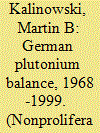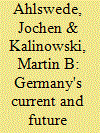| Srl | Item |
| 1 |
ID:
021677


|
|
|
|
|
| Publication |
Spring 2002.
|
| Description |
146-160
|
|
|
|
|
|
|
|
|
|
|
|
|
|
|
|
| 2 |
ID:
114438


|
|
|
|
|
| Publication |
2012.
|
| Summary/Abstract |
In the past, Germany reprocessed a significant amount of its spent nuclear fuel, partly on its own territory but mostly as a customer of British and French reprocessing plants. In mid-2005, Germany stopped this practice, banning new transports of spent fuel for reprocessing-although the already-exported material would be allowed to be reprocessed and recycled in German reactors as mixed-oxide (MOX) fuel. In total, about 6,500 tonnes of heavy metal have been contracted for reprocessing, but a significant portion of this material has neither been reprocessed nor recycled as MOX fuel in German reactors. Due to the complex import-export history and the partly nontransparent information policy of the German government and utilities, a comprehensive and up-to-date plutonium balance for Germany is not publicly available. This report provides an assessment of Germany's plutonium inventory (stored domestically or abroad) based on open-source information. Special attention is paid to the issue of whether the entire inventory of separated plutonium can be completely irradiated in German nuclear reactors before the last of them are shut down in 2022. The authors conclude that Germany's stock of plutonium waiting to be recycled was about 12.2 tonnes as of 2010; this plutonium should be completely re-imported from the United Kingdom and France by 2017. Germany's MOX-consumption capacities should be sufficient to irradiate the remaining plutonium, although further delays are expected that could leave Germany with an inventory of separated (unirradiated) plutonium.
|
|
|
|
|
|
|
|
|
|
|
|
|
|
|
|
| 3 |
ID:
115969


|
|
|
|
|
| Publication |
2012.
|
| Summary/Abstract |
This article deals with the plutonium production capabilities in civilian research reactors and the resulting proliferation risks. A complete record of all civilian research reactors located in Non-Nuclear Weapon States and de-facto Nuclear Weapon States is compiled and systematized according to their type. A discussion of the various production paths and scenarios for plutonium with those reactors follows. In order to derive an assessment with a broad coverage, partly diverse fleet of reactors, two designs representative of light water and heavy water moderated reactors (which account for 82 percent of the total installed capacity in Non-Nuclear Weapon States and de-facto Nuclear Weapon States) were chosen and included in burn-up calculations with the Monte Carlo code KENO V.a and Origen-S, both incorporated in the modular system Scale-6. The effective production rates in fuel elements as well as by irradiation of targets are then applied to calculate the capabilities of plutonium production of each considered research reactor. The results provide an overview of the proliferation relevance of the global research reactor fleet and its regional distribution.
|
|
|
|
|
|
|
|
|
|
|
|
|
|
|
|